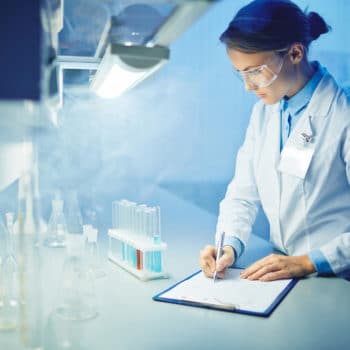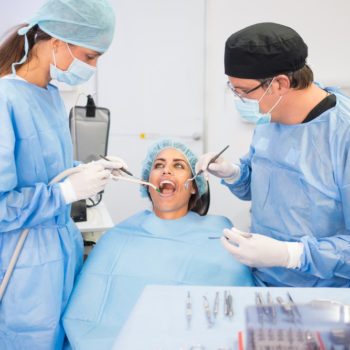Why We Love It
-
$119,270Potential Avg. Salary
-
3.1%Job Growth Rate
-
Growing DemandJob Outlook
-
Dependable Daily WorkloadCareer Attribute
Pharmacists work to fill prescriptions in the amounts and dosages prescribed by physicians. They review prescriptions, fill orders, and answer any questions patients have about the medication. They also review patient medical records to ensure no dangerous conflicts are present with other medications.
Recommended Schools
What is a Pharmacist?
The following job responsibilities are common for individuals in pharmacist roles:
- Fill prescriptions per the instructions provided by physicians
- Answer patient questions about prescriptions and provide usage guidelines
- Review all medications being taken by a patient to ensure a new prescription won’t result in dangerous conflicts
- Manage pharmacy staff, including clerks and pharmacy technicians
- Administer immunizations like flu shots, and hold health and wellness clinics
A Day in the Life
Pharmacists are the individuals responsible for ensuring prescription medications are safely delivered to the individuals who need them. When a customer visits a pharmacy, he presents a prescription from a physician to the pharmacist. The pharmacist is responsible for validating the prescription and dispensing the medication in the prescribed amounts. The pharmacist also reviews all of the other prescriptions a customer is taking to make sure the new prescription won’t cause any negative conflicts or reactions.
Some pharmacists specialize in compounding—which is the process of combining ingredients to create medication. A pharmacist may be required to create prescription compounds to fill prescriptions, or he/she may simply choose the correct medications from a stockpile of common medications. Once the prescription is filled, the pharmacist presents it to the patient, reviews common side effects and dangers of the medication, and answers any questions the patient has about the prescription.
In addition to working with patients and prescriptions, pharmacists often act as pharmacy managers. They recruit, hire, train, and manage pharmacy staff, including cashiers and pharmacy technicians. They also deal with insurance companies to ensure patients pay the correct deductible when picking up prescriptions. They may also need to recommend alternative medications—such as generic formulations—when prescription costs are too steep for patients to afford.
Typical Work Schedule
Most pharmacists work full-time schedules, but the hours worked can vary greatly by employer. While some pharmacies may be open during normal business hours, some are open on evening, weekends, or even 24 hours a day. For this reason, some pharmacists work evening shifts, overnight shifts, and on holidays or weekends.
Typical Employers
Most pharmacists work for major pharmacies and drug stores like Walgreens, Rite-Aid, and CVS. Some are also employed by grocery stores and department stores that have on-site pharmacies. A small set of pharmacists may be self-employed and own and manage their own pharmacies.
Recommended Schools
How To Become a Pharmacist
To become a pharmacist, you must complete a Doctor of Pharmacy (Pharm.D.) degree program. However, there are multiple paths you may take to complete this required degree. Some programs allow admittance directly out of high school. Students can apply for admittance to the program with no prior college coursework. Programs that admit high school graduates typically require six years of study in the program, but they eliminate the need to earn other degrees before entering pharmacy school.
Other programs may require candidates to hold either an associate’s degree of bachelor’s degree before admittance. Common majors for aspiring pharmacists include chemistry, biology, and pharmaceutical sciences. After earning the appropriate associate’s or bachelor’s degree, you’ll need to take the Pharmacy College Admissions Test (PCAT). Passing—and doing well—on the PCAT is a requirement for admittance to most pharmacy graduate programs. For students that take this path, the number of years required to earn a Pharm.D. is reduced to 3-4 years.
One benefit of pursuing the associate’s or bachelor’s degree option before entering a graduate pharmacy program is that you’ll qualify for pharmacy technician opportunities sooner. Working as a pharmacy technician allows aspiring pharmacists to gain professional experience in the field before graduation from a Pharm.D. program. This experience can help you be more competitive after graduation because you’ll have both the experience and degree needed to succeed in the field.
Pharmacist Salary Data
We’ve provided you the following to learn more about this career. The salary and growth data on this page comes from recently published Bureau of Labor Statistics data while the recommendations and editorial content are based on our research.
National Anual Salary
Low Range
$107,810Average
$119,270High Range
$154,040National Hourly Wage
Low Range
$52/hrAverage
$57/hrHigh Range
$74/hrHow do Pharmacist salaries stack up to other jobs across the country? Based on the latest jobs data nationwide, Pharmacist's can make an average annual salary of $119,270, or $57 per hour. On the lower end, they can make $107,810 or $52 per hour, perhaps when just starting out or based on the state you live in.
Salary Rankings And Facts
#30 Nationally for All Careers
Above Average Salary Nationally
Programs and Degrees
Here are the most common degrees for becoming a Pharmacist. a is usually recommended and specifically a degree or coursework that prepares you for the particular field, see below.
Highest Education Among Pharmacists
- 54.8% Doctorate
- 6.1% Masters
- 36.6% Bachelors
- 0.9% Associates
- 1.4% College
- 0.1% High School
- 0.1% Less than High School
Job Growth Projections and Forecast
2014 Total Jobs
297,1002024 Est. Jobs
306,200Job Growth Rate
3.1%Est. New Jobs
9,100How does Pharmacist job growth stack up to other jobs across the country? By 2024, there will be a change of 9,100 jobs for a total of 306,200 people employed in the career nationwide. This is a 3.1% change in growth over the next ten years, giving the career a growth rate nationwide of Above Average.
Growth Rankings And Facts
#518 Nationally for All Careers
Above Avg. Growth Nationally
What Companies Employ The Most Pharmacists
| Industry | Current Jobs | New Jobs Needed | % Increase |
|---|---|---|---|
| Pharmacies and drug stores | 125,800 | -6,800 | -7% |
| General medical and surgical hospitals; private | 55,800 | 4,000 | 4% |
| Grocery stores | 23,300 | 1,100 | 1% |














